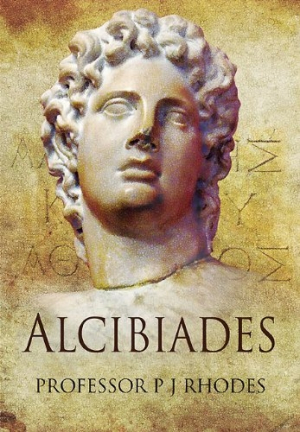Alcibiades
Fact, Fiction, Farce
“Defrauder of many, scoundrel to most, traitor to all” is how one minor member of the cast aptly describes the title character of Jack Meyer’s satirical novel, Alcibiades. Part fact, part fiction, part farce, as the subtitle quite properly exclaims, Meyer’s work is at times brilliant, at times intriguing, and, sadly, at times sophomoric.
This is Meyer’s second foray into the world of the near-legendary and uniquely tragic hero of the saga of the Peloponnesian War. His previous work was a play in three acts, and there are passages in this novel that read like stage directions. The book has a narrator, Thucydides the younger, but he is soon forgotten as Meyer inserts historical asides, summarizes Greek plays—Aeschylus’s Orestia and Aristophanes’s The Clouds—and then changes voice to allow characters, historical and fictional, to engage in dialogue. Thucydides does return during the trial of Socrates, a section that feels tacked on to the main story.
Meyer knows his hero—or more appropriately, anti-hero—and his setting, and cannot be faulted on his history. His familiarity with Greek literature and philosophy is also apparent, and the succinctness with which he summarizes great works and ideas from the era is to be applauded, especially as he manages to do so in a very entertaining manner. Unfortunately, he expends almost all of the credit he earns with the reader on punditry that undermines not only the historical tale but also the satirical point of his story.
For the most part, Meyer has his characters speak in voices that fit their period, but at other times he has them shift to mouth such incongruous lines as, “Bejesus, Socrates, I believe I beturded myself,” or lapse into a mantra of, “Om mani pedme Hung.” Just when the reader feels Meyer has reached rock bottom, he digs the hole even deeper by having Siddhartha and his traveling companion, Yogurtus the goatherd, arrive in Athens, along with a spaceship of “Hudsonians.” Meyer shifts voice and style again after this unfortunate incident, and the finale, like most of the opening act of the book, is authentic and entertaining, even if it does feel rushed.
As a historian, philosopher, and storyteller, Meyer is quite good—although most of the work was done for him by Plato, Thucydides, and other ancient Greeks, Alcibiades himself among them. When done well, satire is an art that can be powerful and brilliant, but Meyer takes a decidedly disappointing, pun-heavy approach here by trying to make this classic story into a mirror for and commentary on the present day.
Reviewed by
Mark McLaughlin
Disclosure: This article is not an endorsement, but a review. The publisher of this book provided free copies of the book and paid a small fee to have their book reviewed by a professional reviewer. Foreword Reviews and Clarion Reviews make no guarantee that the publisher will receive a positive review. Foreword Magazine, Inc. is disclosing this in accordance with the Federal Trade Commission’s 16 CFR, Part 255.

